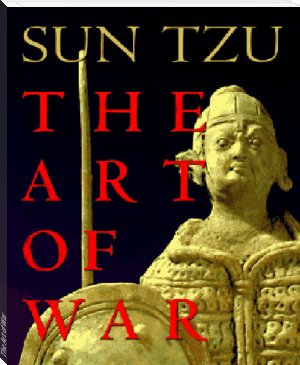The Art of War by Zi Sun (phonics reader .txt) 📖

- Author: Zi Sun
- Performer: 0976072696
Book online «The Art of War by Zi Sun (phonics reader .txt) 📖». Author Zi Sun
5. If you are anxious to fight, you should not go to meet the invader near a river which he has to cross.
[For fear of preventing his crossing.]
6. Moor your craft higher up than the enemy, and facing the sun.
[See supra, ss. 2. The repetition of these words in connection with water is very awkward. Chang Yu has the note: "Said either of troops marshaled on the river-bank, or of boats anchored in the stream itself; in either case it is essential to be higher than the enemy and facing the sun." The other commentators are not at all explicit.]
Do not move up-stream to meet the enemy.
[Tu Mu says: "As water flows downwards, we must not pitch our camp on the lower reaches of a river, for fear the enemy should open the sluices and sweep us away in a flood. Chu-ko Wu- hou has remarked that 'in river warfare we must not advance against the stream,' which is as much as to say that our fleet must not be anchored below that of the enemy, for then they would be able to take advantage of the current and make short work of us." There is also the danger, noted by other commentators, that the enemy may throw poison on the water to be carried down to us.]
So much for river warfare. 7. In crossing salt-marshes, your sole concern should be to get over them quickly, without any delay.
[Because of the lack of fresh water, the poor quality of the herbage, and last but not least, because they are low, flat, and exposed to attack.]
8. If forced to fight in a salt-marsh, you should have water and grass near you, and get your back to a clump of trees.
[Li Ch`uan remarks that the ground is less likely to be treacherous where there are trees, while Tu Mu says that they will serve to protect the rear.]
So much for operations in salt-marches. 9. In dry, level country, take up an easily accessible position with rising ground to your right and on your rear,
[Tu Mu quotes T`ai Kung as saying: "An army should have a stream or a marsh on its left, and a hill or tumulus on its right."]
so that the danger may be in front, and safety lie behind. So much for campaigning in flat country. 10. These are the four useful branches of military knowledge
[Those, namely, concerned with (1) mountains, (2) rivers, (3) marshes, and (4) plains. Compare Napoleon's "Military Maxims," no. 1.]
which enabled the Yellow Emperor to vanquish four several sovereigns.
[Regarding the "Yellow Emperor": Mei Yao-ch`en asks, with some plausibility, whether there is an error in the text as nothing is known of Huang Ti having conquered four other Emperors. The SHIH CHI (ch. 1 ad init.) speaks only of his victories over Yen Ti and Ch`ih Yu. In the LIU T`AO it is mentioned that he "fought seventy battles and pacified the Empire." Ts`ao Kung's explanation is, that the Yellow Emperor was the first to institute the feudal system of vassals princes, each of whom (to the number of four) originally bore the title of Emperor. Li Ch`uan tells us that the art of war originated under Huang Ti, who received it from his Minister Feng Hou.]
11. All armies prefer high ground to low.
["High Ground," says Mei Yao-ch`en, "is not only more agreeable and salubrious, but more convenient from a military point of view; low ground is not only damp and unhealthy, but also disadvantageous for fighting."]
and sunny places to dark. 12. If you are careful of your men,
[Ts`ao Kung says: "Make for fresh water and pasture, where
you can turn out your animals to graze."]
and camp on hard ground, the army will be free from disease of every kind,
[Chang Yu says: "The dryness of the climate will prevent
the outbreak of illness."]
and this will spell victory. 13. When you come to a hill or a bank, occupy the sunny side, with the slope on your right rear. Thus you will at once act for the benefit of your soldiers and utilize the natural advantages of the ground. 14. When, in consequence of heavy rains up-country, a river which you wish to ford is swollen and flecked with foam, you must wait until it subsides. 15. Country in which there are precipitous cliffs with torrents running between, deep natural hollows,
[The latter defined as "places enclosed on every side by steep banks, with pools of water at the bottom.]
confined places,
[Defined as "natural pens or prisons" or "places surrounded by precipices on three sides—easy to get into, but hard to get out of."]
tangled thickets,
[Defined as "places covered with such dense undergrowth that spears cannot be used."]
quagmires
[Defined as "low-lying places, so heavy with mud as to be impassable for chariots and horsemen."]
and crevasses,
[Defined by Mei Yao-ch`en as "a narrow difficult way between beetling cliffs." Tu Mu's note is "ground covered with trees and rocks, and intersected by numerous





Comments (0)